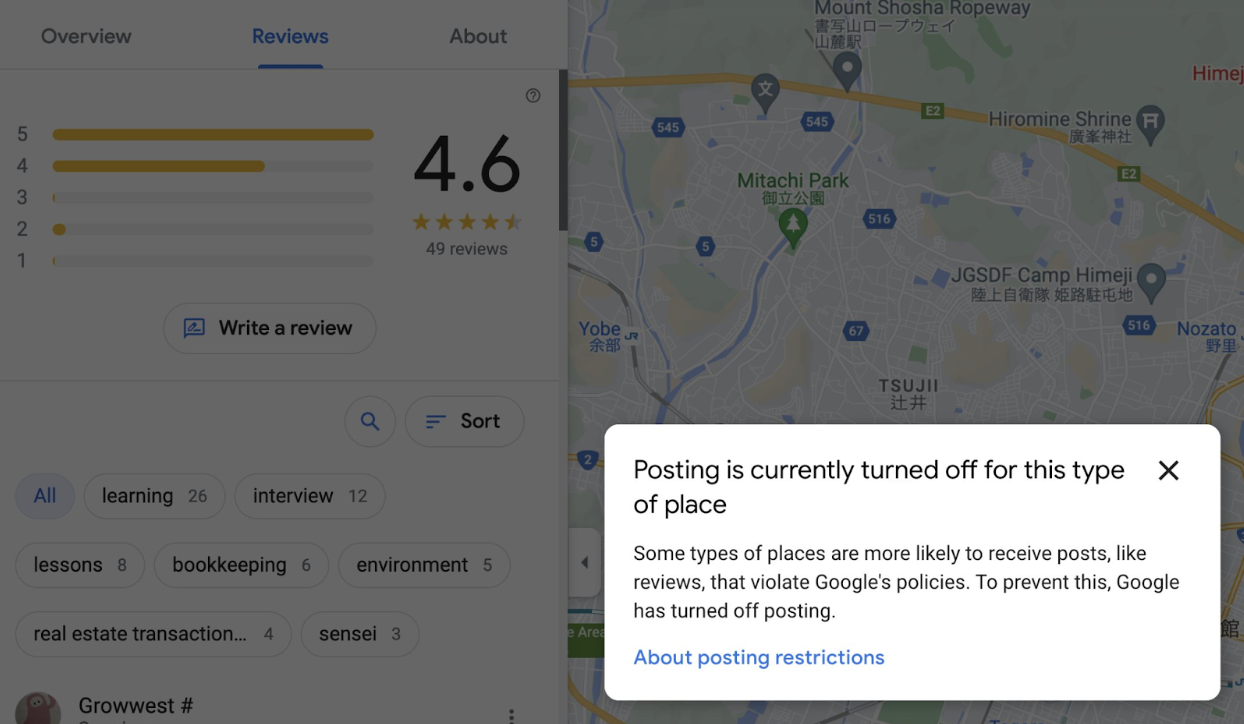What Are AI Agents? And Why Are They Critical to Local Marketing Success?
Local Memo: Google Confirms Boosting “Openness” as Local Ranking Signal
Local Memo: Google Confirms Boosting “Openness” as Local Ranking Signal
In this week’s post, learn about openness as a local ranking signal; the impact of SGE on search traffic; the planned launch of Tracking Protection for Chrome; what disabling reviews looks like in Google profiles; and a new Google search quiz.
Google Confirms Boosting “Openness” as Local Ranking Signal
Google search spokesperson Danny Sullivan has responded to the finding by Joy Hawkins (corroborated by others) that whether a business is open at the time of search has become a significant ranking factor. Sullivan replied to Hawkins’s inquiry on X, stating that Google has “long used” the openness of a business as a ranking signal, and recently strengthened the signal for “non-navigational” queries.
Asked to clarify the term “non-navigational,” Sullivan wrote, “If you were searching for a name of a business, that would generally be [because] you wanted to navigate / find that particular business. If you were searching for a general topic, that’s non-navigational.” The idea seems to be that when Google infers that the searcher is looking for several local options, the results will favor businesses that are open at the time of search.
Several commentators have pointed out that a list of businesses open now may not be what the searcher wants — think of longer-funnel searches such as finding an attorney or pediatrician. In addition, as Sherry Bonnelli wrote, “Just wait: every business will switch their hours to 24/7 — even brick and mortars that aren’t open 24/7. This will cause shopping issues.” Sullivan’s response: “I wouldn’t recommend businesses do this, given the ranking signal may continue to be adjusted.”
AI in SGE Impacts 87% of Local Queries
Greg Sterling offers a summary of recent studies on the characteristics of searches conducted with Google’s Search Generative Experience (SGE). He cites a Wall Street Journal report which finds that publishers believe they will lose 20% to 40% of their traffic if SGE becomes the default search experience. As for the incidence of AI snapshots in SGE results, another study finds that 90% of all searches and 87% of local searches contain a snapshot, with 45% of the links found in snapshots not appearing in the top 10 organic search results.
Google to Launch Tracking Protection
Google has announced the January 4 launch of Tracking Protection in Chrome, a setting that lets users prevent websites from capturing their data. The announcement seems to be a followup to prior statements that third-party cookies would be phased out for 1% of users at the beginning of Q1, with a full phaseout planned by the end of Q3. Google now says that 1% of users will see the test of Tracking Protection starting in January. Users chosen for the test will be notified when they use Chrome. Google says that some websites may not load correctly with third-party cookie protections turned on — part of the reason for the slow rollout, as Google hopes web developers will take the several months of the phaseout period to update their sites appropriately.
What It Looks Like When Google Disables Local Reviews
A user in Japan has spotted a public notice on a Google profile for a school, stating that “posting is currently turned off for this type of place.” The statement goes on, “Some types of places are more likely to receive posts, like reviews, that violate Google’s policies. To prevent this, Google has turned off posting.” Barry Schwartz reminds us that earlier this year, Google shared new clarifying language about profiles that may be prevented from receiving user generated content in the form of photos, videos, and reviews. Some restrictions may be placed on a temporary basis, such as the aftermath of a controversial incident, whereas some restrictions for categories like police stations and prisons may be long term. The posted notice seems to reference this policy.

Courtesy Hiroko Imai
Google Shares Search Trends Quiz
Google is celebrating the end of its 25th year with a quiz on popular searches since the inception of Search Trends in 2004. Local search is prominent in the first question, which asks users which U.S. city searches for Italian food more than any other cuisine. Other themes include travel, hairstyles, emojis, pizza, astrology, the Super Bowl, and cooking.




